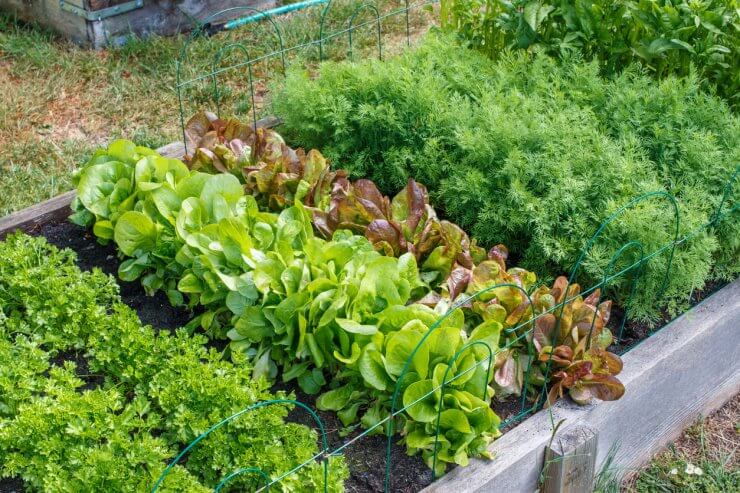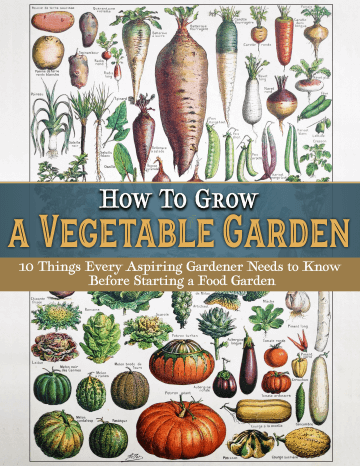
Let’s talk about health. No, I’m not your doctor, and no, I’m not about to make you feel guilty about the fact that you didn’t exercise yesterday. I, too, may or may not have exercised yesterday. As a food gardener, though, I am interested in what I eat and how it impacts my health. Since I can’t very well grow a chocolate bar in my garden, that topic is a bit more limited to vegetables that grow above ground and those that grow below ground.
To be clear, vegetables are good for you. Whether it’s kale or carrots or peas or potatoes, any vegetable has more health benefits than most anything you can get from the drive-thru. But when you want to get into the details, dig down into the carbs and starches and fibers and vitamins, vegetables grown above ground may be more suitable for some diets and health regimens.
Discover 10 top tips for growing, harvesting, and enjoying fruits, vegetables, herbs and more from your home garden—when you access the FREEBIE How to Grow a Vegetable Garden, right now!
The health benefits of vegetables grown above ground
So why do health nuts love vegetables grown above ground? Like most foods, vegetables have varying degrees of nutritional value. As an example, kale is a “superfood” for a reason (and no, as cool as it would be, it didn’t get that moniker because Superman eats it). It’s loaded with vitamins A, K, and B6. It contains more vitamin C than an orange. It’s low-calorie, low in carbohydrates, and high in fiber.
In fact, many of the vegetables grown above ground are low in carbohydrates, making them ideal for keto and other low-carb, paleo, and whole food based diets. Raw spinach only has about 1 gram of carbohydrates per cup according to the USDA, and it’s a great source of iron, calcium, and vitamin K. Broccoli, (around 5g per cup), may help reduce osteoarthritis, lower blood sugar, and help prevent cancer.
It’s not just greens, either. Cauliflower (5g carbs per cup) is high in fiber and antioxidants and you can make a mean pizza crust with it. Red bell peppers are low in carbs (6g per cup) and provide a bevy of B vitamins, as well as vitamins A, C, E, and K. You’ll also get a nice amount of minerals like iron, magnesium, phosphorus, manganese, and potassium.
Discover 10 top tips for growing, harvesting, and enjoying fruits, vegetables, herbs and more from your home garden—when you access the FREEBIE How to Grow a Vegetable Garden, right now!
You can also go purple, with nutritionally-dense eggplant. Like many other vegetables grown above ground, it’s low in carbohydrates (5g per cup) and loaded with antioxidants. Eggplant is also rich in minerals like calcium, phosphorus, potassium; it’s high in fiber; and it’s loaded with polyphenols, which may help reduce the risk of cancer. There’s also some evidence that the anthocyanins in eggplant may improve cognitive function. (Note to self – plan for more eggplant in the garden next season!)
For patient gardeners, asparagus is another vegetable that not only tastes great but is jam-packed with health benefits and is low carb (0.6g per spear). I really enjoy asparagus because it’s one of the first vegetables ready for harvest in the spring. It’s the vegetable that tells me winter is over. The only “problem” with asparagus is that you can’t harvest it until the second year. That said, it has loads of folate, plenty of vitamins, it’s rich in Omega-3 and Omega-6 fatty acids, and it provides minerals like iron, copper, and manganese.
Does this mean root or “below ground” vegetables are bad for you?
Not at all. Radishes are actually one of the very few “below ground” vegetables low in carbs (4g per cup). Sweet potatoes and carrots are good sources of vitamin A. Most root vegetables are high in antioxidants, as well as fiber, vitamins, and minerals. The “problem” with root vegetables is that they tend to be exceptionally high in carbohydrates and because eating carbs makes us want more carbs, we tend to over-consume them, which spikes our blood sugar, which leads to inflammation and the list goes on—but I’m sure your doctor can guide you on that with better advice than I can!
As with many things in life, good and bad is relative, and balance is important. But if you’re looking for a healthier approach to gardening, it might be wise to go a bit heavier on the vegetables grown above ground and consider how many root vegetables you want to grow.
Discover 10 top tips for growing, harvesting, and enjoying fruits, vegetables, herbs and more from your home garden—when you access the FREEBIE How to Grow a Vegetable Garden, right now!
What’s your opinion on above ground vs. below ground vegetables? Do you find that one or the other impacts your health more? I’d love to read your thoughts in the comment section.





I find this article to be very strange, with the apparent assumption that “carbs are bad,” even when obtained from home-grown root vegetables. The diverse types of carbohydrates (including fiber) in root vegetables means our bodies do not react as with highly processed carbohydrates. I don’t think it’s wise to spread “carb-phobia” among people growing and consuming whole foods at home.